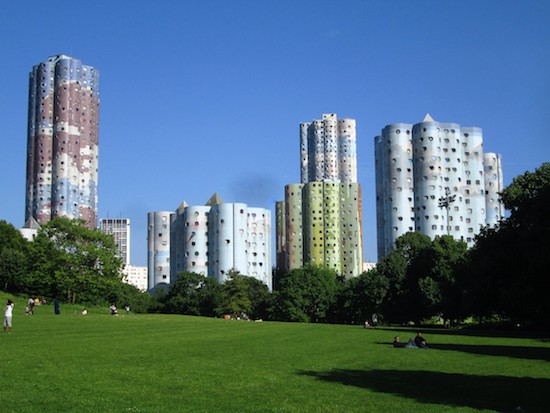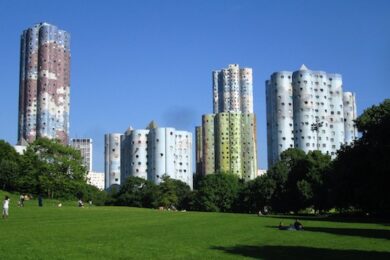17 Social Scar Tissue in Nanterre; all images courtesy Owen Hatherley
Next year will mark a decade since Owen Hatherley first swung his wrecking ball into Britain’s contemporary built environment with the publication of Militant Modernism. Since then he has been unstintingly prolific, with eight further full-length books and a journalistic career which has become associated with a caustic and incisive exploration of architecture, urbanism, and popular culture.
In his latest book Trans-Europe Express, Hatherley explores a disparate collection of cities – Dublin, Bologna, Hull, Bergen, Split, etc. – in the search for the elusive answer to the question: “what is a European city?”
The end result is both a highly interesting and rather compelling read. Unlike some writers whose words really only seem to feel alive when being deployed to criticise (Hatherley is exceptionally withering towards Paris and acerbic on Skopje), he is equally adept at enthusing about the positive (the architectural school in Bergen, the squatter communes in Hamburg, for example).
The book has its drawbacks – while Hatherley claims he “doesn’t do vox pops”, a few more personal insights from those living in and amongst these different urban environments would certainly not go amiss. And there is a sense that, since the bulk of the book has been adapted from articles originally published pre-EU referendum, it is not quite as insightful or as geopolitically up-to-the-minute as it might have been in terms of a commentary on the “lost continent”.
Drawbacks aside, Trans-Europe Express is a thoroughly enjoyable and worthwhile book, one that provides an excellent analysis of how such disparate European cities have, and are continuing to, develop, some with a large degree of consideration and engagement of their inhabitants, and some with shamefully little.
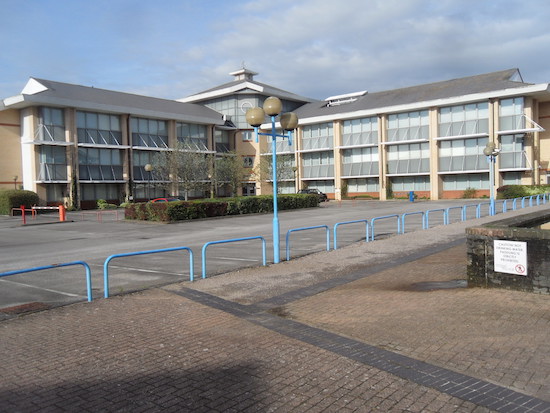
Ocean Village, Southampton, Gateway to the Empire
In the introduction to the book you describe how the day after the EU referendum, you got into an argument with your mum who voted Leave because she thought the EU’s rules make any left-wing programme impossible. You write that you remain unconvinced and believe a European super-state should be a left-wing demand. Why is that?
There hasn’t ever been a nation-state created without some kind of project of exclusion and bordering. Partly in this book, one of the things that interested me a lot is the way that central Europe, and the Balkans in particular, went from being enormously multi-cultural territories to being angry little nation states during the twentieth century. Poland went from being one of the most multi-cultural places in the world in 1939 to now, second almost to North Korea, being the most homogenous – it’s deeply depressing.
There are positive anti-colonial versions of nationalism but, by and large in Europe, its effect has been very negative. In many ways, England has been one of the models for that – the only thing that really fits the capitalist nation state that everyone wants in the rest of Europe, is what they think France and Britain are.
On the one hand, the EU is bordered, with a horrible border on the Mediterranean which is brutally enforced – the number who have died trying to cross that in the last few years far outnumber those who died trying to cross the Berlin Wall. But within the EU you can go from Lisbon to Tallinn without anyone checking your passport which is an extraordinary achievement. The expansion of that outwards would be quite utopian, and that aspect of the ‘super-state’ I rather like. When things operate at a global and continental level it’s important to be able to vote on them at that level, which the idea of the European Parliament was intended to do.
I have intractably mixed feelings for it, but I couldn’t have voted Leave in the referendum in the aftermath of the killing of Jo Cox and those UKIP posters – that vote would have seemed an endorsement of something creeping into British public life which is really horrifying.
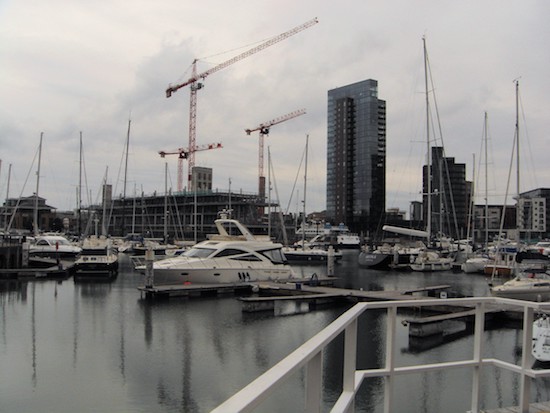
The European Ocean Village
You go on to say that ‘if not by institutional osmosis, then perhaps the ease of travel…’ might mean our cities adopt better design. But at the same time, in your previous books you’ve decried the ‘Europeanisation’ of urban space in the New Labour era as flawed and vacuous.
The argument of the books where I postulated that – A Guide to The New Ruins of Great Britain and A New Kind of Bleak – was that it was a kind of cargo-cult version of Barcelona, Berlin, Rotterdam, or wherever: trying to use the market to achieve something which is usually done via very strong public regulation.
Somewhere like Salford Quays compared to somewhere like the more capitalistic part of Hamburg is just not very good by comparison. The examples in Germany, Spain or France are all more positive – the quality of open spaces, their orientation towards the water, simple things like the number of benches, their integration with surrounding areas and landscape, their relation towards waste and sustainability, their architectural quality, the amount of money that’s been spent on materials to ensure quality of construction.
One of the things that makes more recent developments like King’s Cross Central so interesting is that you can almost believe you were in Europe. It may have come out of a trial-and-error process of places like Stratford, Salford Quays, and Greenwich’s Millennium Village being such failures at anything other than making money, and also that it was an area with a lot of people with sharp elbows – a lot of conservation, consultation, and a sense that this can’t be shonky. But with that exception, I can’t think of any recent British urban space that is on the level of what is quite casually churned out in lots of the rest of western and north-western Europe.
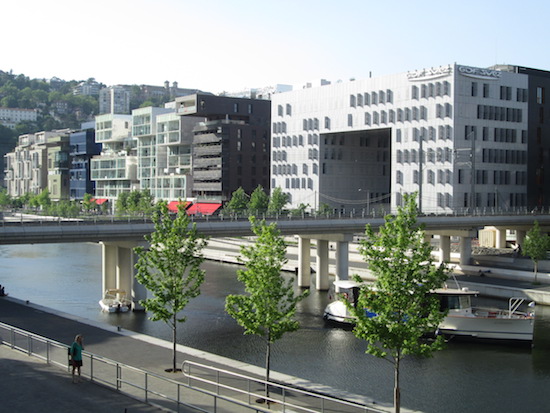
Lyon’s Ocean Village
The technique you adopt when exploring an urban space is something that intrigues me. Do you adopt the psychogeographic technique of the dérive, or are you more prescriptive, armed with an itinerary and a map with pre-researched sites to tick off?
Certainly, pre-researched but I also do a lot of post-research too. In terms of psychogeography, I liked Iain Sinclair and the Situationists when I was 17 as many do, but I’ve had fairly mixed feelings about it since. I find the whole ley lines aspect quite tiresome, but also that presumption against change or development of any kind that becomes very heritage society.
There was a Sinclair piece about the changes in Elephant and Castle that made me want to throw it out the window – his inability to see that what was happening there was actually something quite interesting. He couldn’t do his usually spiel about Jack the Hat, Aleister Crowley and Guy Debord, the crumbling buildings being suffused with the ley lines from Hawksmoor, etc. While Sinclair was good in criticising the Olympics, even if it had been good and the Village had all been social housing, he still would have criticised it because that’s what he’s about. He’s got his house in Hackney and his house in Hastings, and like most people of that generation who invested in property, probably sits on material wealth greater than around seven countries.
I like the psychogeographic idea of exploring place in an intuitive way, not planning things out too much, but I try to drop all the mystical bollocks, as well as the belief that by doing it you are somehow committing a revolutionary act.
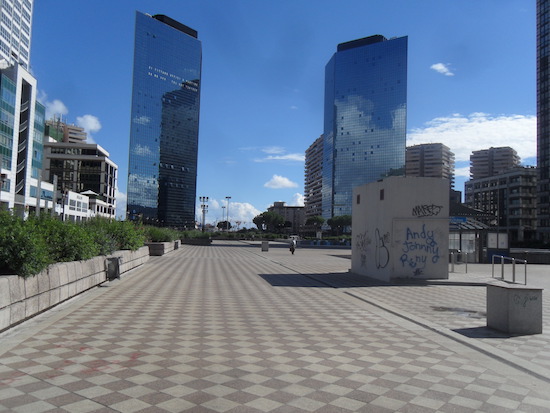
Emptiness Amid Density, Naples
When I interviewed Will Self last year he said that he shared your fondness for high-modernist and Brutalist architecture but without your socialistic nostalgia attached to it. Would you say that you do have a romantic longing for the kinds of architecture and urban planning that hasn’t been a part of your lived experience?
Everyone says it so I guess it must be true. In terms of lived experience – I was born in an NHS hospital, went to a state school, lived in council housing numerous times, use public transport, have been through the mincer of the benefit system… so, I don’t think the welfare state is something I gaze at longingly in this ‘romantic’ way.
I like the phrase of John Berger’s that after the war we got ourselves halfway to democracy and the rudiments of a genuinely egalitarian social democratic state, some of which survives, some of which has been destroyed, and parts of it, like the benefits system, have been made more punitive. I very much believe that the project shouldn’t have stopped halfway and should be completed.
My feeling is that the prohibition against nostalgia is faintly silly at a political level. I don’t like it because it presupposes that we never won anything and have nothing to fight for. Actually, over the last 100 years, various things have been constructed by the labour movement, by well-meaning Fabians and by liberals in some cases, that have been under sustained attack since 1979, which I think are worth fighting for and pointing out – here is an example of where it worked, and also where it didn’t work and why.
So, in the sense that I look at the past at certain points and consider it to have done things better, maybe it is nostalgic, but I’ve no desire to live in the 1950s.
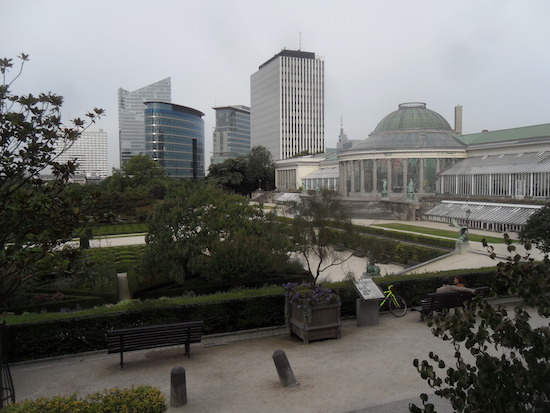
Imperial and Modern Brussels
The similarities you draw in the book between Dutch and British cities are very interesting, but also the distinctions – you say that ‘people made Dutch cities better’. Why haven’t people made British cities better?
I think they have actually, but it’s more about whether it’s with or against the grain. This is the thing eco-urbanists point out all the time – if you look at how Amsterdam and even Rotterdam became so friendly to cyclists and have great public transport, etc., people seem to think it’s because of their morphology – they’re full of narrow streets and that’s why it’s like that. Which is total nonsense – you look at photographs of Amsterdam and Rotterdam in the early-1960s and they are as choked with traffic as anywhere.
What happened was that people tried to curb and limit that and tried to expand public space – expanding pavement into the road, expanding cycle lanes, lots of subtle things like that. They were able to get the ear of local government. Collections of hippies and Situationists like the Provo Movement had a lasting influence on urban policy, which was never true here to the same extent.
Mostly the main influence of the 1960s on British cities has been to create a demonised image of modernist planning which was then enormously useful for Thatcherism. Its positive achievement is fuck all, whereas the positive achievement of 1968 in somewhere like the Netherlands is that it has very pleasurable public spaces, cycling and public transport.
London is probably the city that has gone furthest towards this. I don’t think Londoners fully appreciate this; its public transport system is far superior to that of any other British city. The social city never really happened in London but what there is, is places like Elephant and Castle which are usually the result more of the fact that the market has failed to produce something like a Westfield or Brent Cross; instead of which it became cheap enough that people in the very multi-cultural surrounding area were able to use it as a social space.
The fact that it has been able to be saved on the basis of it being appealed on equality law was really interesting – they argued that what was intended to be built in its place had no provision for the minority ethnic groups or the elderly that use it. I thought that was incredibly astute that they used that line of attack and I hope it’s used much more often.
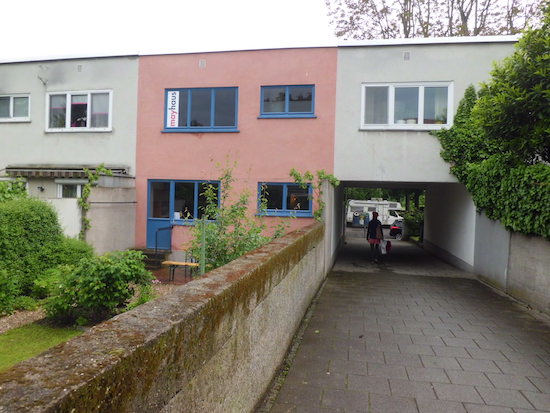
The Old New Frankfurt
I wonder what you made of [principal of Zaha Hadid Architects] Patrik Schumacher’s recent intervention, that capitalism is the only way to solve the housing crisis and that ‘Generation Rent’ should all make do with smaller living spaces?
I can’t work out whether for him this is all a conceptual art project, because he’s a smart guy. I take his theoretical claims seriously, I don’t agree them, but those manifestos on parametricism he produced were wrong-headed but not charlatanry.
His political interventions are, I think, just trolling, and the typical trolling of the ex-Marxist. He’s come to capitalism via Marxism and in the process talks about it in a way that most actual capitalists, to give them their credit, wouldn’t, because unlike him they don’t believe that capital is potentially limitless.
Karl Polanyi in The Great Transformation describes how Britain in the early-nineteenth century came closer than any society has to being completely without any regulation and controls on capital, and it couldn’t continue because it was destroying the fabric of society to the point of anarchy. Polanyi describes it as being a stark utopia that would eventually extinguish all human and animal life.
On the issue of smaller living spaces, for someone whose practice is entirely about creating big empty spaces using really expensive and wasteful engineering, for Schumacher to be arguing for tiny spaces is full of contradiction. What they actually do as architects is astonishingly wasteful but also very generous with space – half the average Zaha Hadid building is just circulation for the sake of it, beautiful circulation but still… Maybe his minimal housing for millennials will have amazing huge staircases and then people will live in cupboards.
The thing that capitalism always promised to people is the aspirational idea – if you struggle, play your cards right, you can get something amazing and glamorous. This intensified life was always the promise of things like pop music and Hollywood, and so on. For it to now be offering you shit, and telling you so, is why I think it’s a conceptual art project, showing what’s inherent to the system. I think that’s what he’s actually doing. More credit to him.
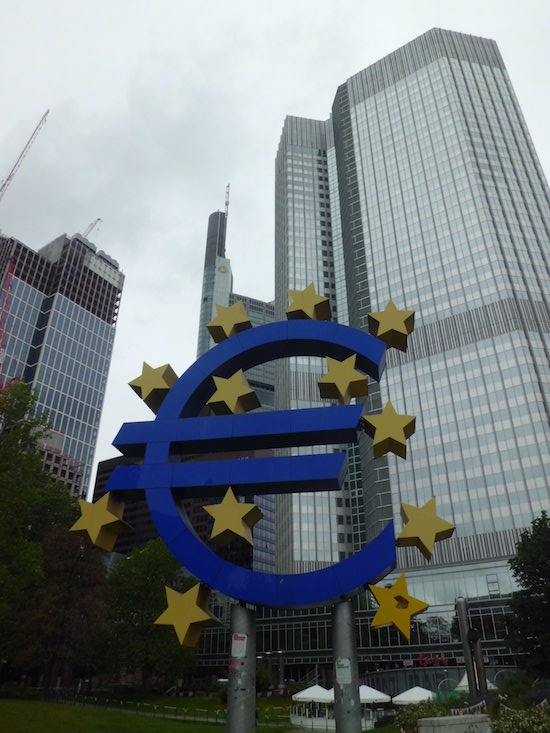
The New new Frankfurt
I’m interested in your view on music and its influence on your perception of place – you have described walking around Brutalist estates listening to side 2 of Low, I had similar experiences walking around Manchester years ago listening to Joy Division…
Yes absolutely, and I do like to make musical and topographical links because they are interesting, but I won’t lie and say I like a lot of new music, because I don’t.
Every great movement has it’s time, and for rock and roll it was from the 1950s to the 1990s. Of course, it continues, in the same way that Mannerist architecture is interesting. There’s always good stuf. But that period of pushing at the limits of the possible and of being the most important thing in a huge amount of young people’s lives, is simply no longer the case. And that’s probably a good thing. It’s probably good that ‘the youth’ are not as obsessed with music as my generation. It’s allowed them to be much more interested in society.
There’s that quote from Tom Vague, about how punk was what we had instead of Baader-Meinhof or the Red Brigades – all three of them probably not very useful in the end, but they channelled the same energies. The absence of that is why young people are able to put their energies into politics in a way that certainly the 90s generation didn’t.
There are exceptions to this – grime being the obvious one in so many respects, the intense territoriality and the way that it, by quite a circuitous route, has been very political. Stormzy at the Brits was a pretty big thing, someone having won an award then threatening to burn the Prime Minister’s house down. All these wankers moaning “where are the protest songs”, completely miss the significance of stuff like that. But it’s not the same thing. It’s consumed in a different way and people don’t take it quite so seriously.
One of the things that pop music did really well was it popularised the avant-garde, which is why the ideas of elitism actually don’t work in Britain because the high and low culture are inextricably linked in something like [David] Bowie, as a very obvious example – something that sounded like The Sweet that would lead you to read William Burroughs. I think bands and artists in the late-70s had the ability to describe their environment, not in a social realist way but more a spatial way. And that’s a great thing which may not exist anymore.
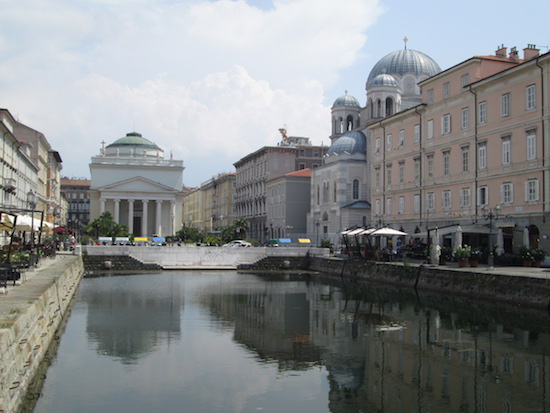
Trieste, Palladianism and Orthodoxy
You recorded a podcast shortly after the death of Mark E. Smith. For you, what was his lyrical and imaginative connection to English urbanism do you think?
It’s hard to say anything on this without recapitulating everything from Mark Fisher’s essays on Mark E. Smith. The Fall are interesting because of the fact that they were so unlike the rest of the Factory environment. People like Tony Wilson ended up just being urban boosters, inviting Richard Florida to Manchester, building Urbis in the centre, and so on. Whereas The Fall were very unmarketable in their vision of Manchester. It was much more about presences of the past and about bizarre things happening within that very jagged montage of landscape. No one’s going to go to Ardwick Bridge because it’s the bridge mentioned in ‘Wings’. One or two weirdos might, but it’s not the same as an exploration of Manchester following The Smiths’ legacy.
People are doing pub crawls round Prestwich now…
Prestwich is impressively boring, it’s like going on a crawl round Dagenham or somewhere. Of course, some of Manchester is very vivid architecturally, but Prestwich is not one of those places.
The nostalgia of somewhere like Manchester is based on (and I think it took New Labour to notice it), the fact that one of the really great British industries was pop music. It would be weird if Manchester hadn’t become wise to the fact that they don’t really produce anything anymore so they might as well exploit what they did well most recently.

Maintaining the Acropolis
In your last interview with tQ, you spoke about your fondness for The Smiths and Morrissey – do you think there needs to be a certain removal, certainly of the latter, off the indie pedestal for a while now?
I suppose I move in unrepresentative circles where his name is mud, which is fair enough because he’s obviously such a cunt and his views are neanderthal. And so classic in some ways of that Baby Boomer generation in the music industry – working class boy in a growth industry, makes good, makes a pot of money, sues his associates and loses, moves to LA and complains about the fact that Manchester doesn’t look like it did when he was a kid. There are thousands of similar people, they live in Spain, Kent, or Cheshire.
But he also happens to have made those four Smiths albums. There’s a youthful ambiguity in them which I think hardens and goes when some people get old.
He’s one of a generation, John Lydon is another – we think they should be special but they’re just like any other old fat cunt on the Spanish coast complaining about Lewisham not looking like it used to. Fuck ‘em really.
It’s nearly ten years since the publication of your first book Militant Modernism. Have you got big ideas for the next ten years – exploring new urban environments around the world perhaps?
I’d rather do a lot more historical stuff that involves going into archives. That would be in terms of books. In terms of journalism there’s still a lot to argue for, and now there’s the novelty that to some extent I’ll be listened to, whereas over the last ten years – certainly the first few anyway – there was never any sense of that.
Now, I think there’s an openness to ideas on housing and planning by people who could end up in government so I’m very keen to influence that in any way that I can. In terms of ‘walking around and looking at things’ books, I don’t want to do them anymore, I feel like I’ve done what I set out to do. This and a book coming later in the year will be the last, after that I will do something else.
Trans-Europe Express by Owen Hatherley is published by Allen Lane

